|
By accessing or using The Crittenden Automotive Library™/CarsAndRacingStuff.com, you signify your agreement with the Terms of Use on our Legal Information page. Our Privacy Policy is also available there. |

Speeding Causes Spike in Deaths on South African Roads
|
|---|
|
|
Speeding Causes Spike in Deaths on South African Roads
Darren Taylor, VOA News
29 April 2016
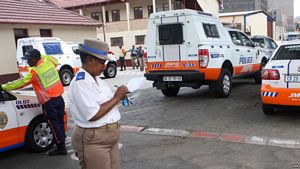 Superintendent Edna Mamonyane, at the Johannesburg Metro Police Department headquarters, says the nation’s drivers are ‘addicted to speed.’ (D. Taylor/VOA) Superintendent Edna Mamonyane, at the Johannesburg Metro Police Department headquarters, says the nation’s drivers are ‘addicted to speed.’ (D. Taylor/VOA)
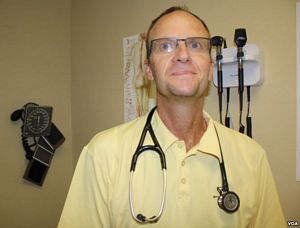 A speeding motorist severely injured Johannesburg physician Wayne Korras and killed two friends with whom he’d been running. (D. Taylor/VOA) A speeding motorist severely injured Johannesburg physician Wayne Korras and killed two friends with whom he’d been running. (D. Taylor/VOA)
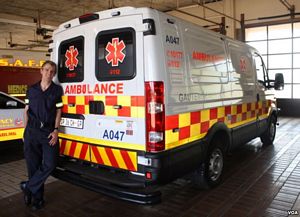 Paramedic Victor Voorendyk works at accident scenes in urban Johannesburg, where speeding motorists too often leave a deadly wake. (D. Taylor/VOA) Paramedic Victor Voorendyk works at accident scenes in urban Johannesburg, where speeding motorists too often leave a deadly wake. (D. Taylor/VOA)
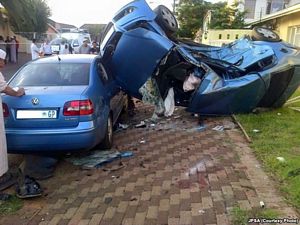 A high-speed collision in a South African suburb leaves wreckage. Many motorists don’t stick to the 60 km an hour urban speed limit. (Photo courtesy JPSA) A high-speed collision in a South African suburb leaves wreckage. Many motorists don’t stick to the 60 km an hour urban speed limit. (Photo courtesy JPSA)
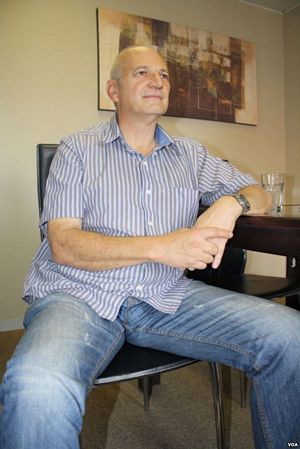 Howard Dembovsky heads the Justice Project South Africa, which calls for tougher measures to curb speeding motorists. (D. Taylor/VOA) Howard Dembovsky heads the Justice Project South Africa, which calls for tougher measures to curb speeding motorists. (D. Taylor/VOA)
|
JOHANNESBURG — Telephones ring and people cough inside a medical center here. The patients are waiting to see Dr. Wayne Korras.
Few of his patients are aware of the general practitioner’s history. As he examines their bodies, they know nothing about the map of scars spread across his chest and back.
A few years ago, Korras was training for a marathon with other runners on a road on the city’s outskirts. Suddenly, a speeding vehicle screeched toward the group.
"A young gentleman who claimed he fell asleep at the wheel – at half past 5 in the morning – drove into us and killed two of my friends. I was airlifted to Milpark" Hospital, the doctor recalls. "I was in a coma there for 28 days with a head injury and a couple of fractures."
Korras spent five months in the hospital. He couldn’t feed himself, couldn’t go to the toilet by himself. Therapists had to teach him to walk, write and talk all over again.
He wasn’t able to practice medicine for four years.
It’s all about speed
Sirens wail as a Johannesburg Metro Police vehicle rushes to yet another car crash scene.
Veteran traffic officer Edna Mamonyane says most collisions happen because South Africans "love to drive too fast."
"For them, it’s about speed and just speed; move, move. … Sometimes these people kill themselves and kill other people," she says.
Paramedic Victor Voorendyk is often a first responder to the chaos.
He says a lot of high-speed accidents happen in “unexpected” places, where the speed limit is a mere 60 kilometers (32 miles) an hour.
"Urban roads, where you’ve got a high-impact collision, head on, between two motor vehicles, and four or five or six people dead in one car. … Recklessness combined with speed is a potent recipe," he says.
‘Wrong’ strategy
Approximately 14,000 people die every year from incidents on South African roads, the national Department of Transportation (DOT) reports. But the figure undercounts fatalities by at least 6,000, says the Justice Project South Africa, a nongovernmental organization that monitors traffic laws.
The DOT did not respond to VOA’s requests for comment.
The government’s tally reflects only fatalities occurring within 30 days of a traffic incident, according to the Justice Project, which does not put a time limit on calculating deaths from traffic-related injuries. It also contends the fatality rate is rising – by about 1,200 a year – and other sources interviewed for this story also say it's increasing.
The Justice Project maintains that authorities have lost control of the roads, mainly because they’ve failed to implement measures that could save lives, such as lower speed limits.
Howard Dembovsky, who heads the organization, says traffic authorities are employing the wrong strategy to prevent speeding: using speed cameras set up on roadsides to trap and fine offenders.
Says Dembovsky: "If a person is doing 250 kilometers (150 miles) an hour on a freeway with a speed limit of 120 kilometers (74 miles) an hour, how does it help you sending him a notice in the post 40 days after the fact, saying we will summon you to appear before the court? It doesn’t help anybody. It doesn’t help me, driving along with my family in the motor car, when that idiot comes plowing into me."
According to city documents, more than 80 percent of the traffic law infringement notices issued by the Johannesburg Metropolitan Police Department in the 2014-2015 financial year were for camera-captured speeding offenses.
Dembovsky says this is "proof" that speed cameras are simply "money-generating tools" for municipalities.
Mamonyane, however, asserts that the cameras will remain “important tools” in the police’s fight against speeding.
"When going too fast hits people’s pockets, then they stop speeding," she insists.
‘I'll eat my motor car’
Dembovsky is convinced though that the best way to deter speedsters is through "proactive" policing, with patrolling officers immediately stopping motorists who drive too fast and either arresting them or serving them citations.
A few police units specialize in cracking down on speeding in South Africa, and they’re highly respected, even by critics of the law enforcement agencies.
Dembovsky credits them with good work, but says it isn’t enough.
"If they happen to tackle one millionth of a percent of the speeding infringements in this country, I’ll eat my motor car on live TV," he says.
Campaigners against reckless driving have called for serial speedsters to be jailed.
But lengthy sentences for even serious traffic crimes are rare in South Africa, as Wayne Korras well knows.
"The gentleman who drove into us and killed two others got three years’ house arrest, which I can’t quite level in my brain," he says.
Road rage
Dembovsky links some of South Africa's traffic incidents to road rage.
“You have people being put into intensive care units – you have people being put into mortuaries – because of road rage. You have people shooting each other. You have people attacking each other with machetes. You have people beating up old-age pensioners.”
Mamonyane says road rage has become an "epidemic," especially in Johannesburg.
"We have some of the worst traffic jams in the world here, and that’s causing a lot of anger and accidents. The roads are too congested.
"Road rage has increased a lot over the past few years. I’ve been an officer for 36 years and I’ve never seen anything like it. When I was a young officer, you never heard of road rage. Now it’s all over.”
At a notoriously dangerous city intersection, there’s constant hooting as evening rush hour begins.
Vee Hermans, a homeless man who begs at traffic intersections, says he sees a lot of anger there.
He remembers how a motorist in a sedan recently cut off another car, leaving the wronged driver furious.
"He went to his boot [trunk] and he pulled out a sword. He wanted to chop off the guy’s head!" Hermans exclaims.
Such rage may continue until South Africa's roads – and the drivers – become safer for all.
Editor's note: This is the second installment in a five-part series.


















